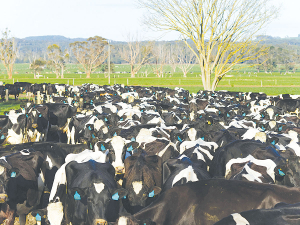NZ Catchment Groups Thrive with ‘Source to Sea’ Approach
The most successful catchment groups in NZ are those that have 'a source to sea' approach.
 Sales of veterinary and horticultural antibiotics in New Zealand have decreased for a fifth year in a row.
Sales of veterinary and horticultural antibiotics in New Zealand have decreased for a fifth year in a row.
Total sales of veterinary and horticultural antibiotics in New Zealand have decreased for a fifth year in a row, dropping by 23% in 2022.
The drop was a key finding of the ‘2022 Antibiotic Agricultural Compound Sales Analysis’ released last week by New Zealand Food Safety (NZFS). The report summarises the trends in the annual sales of veterinary and horticultural antibiotics as part of a national action plan to reduce antimicrobial resistance (AMR).
“The World Health Organisation has identified AMR as one of the top 10 global health threats facing humanity, so seeing a 23% drop in the sale of antibiotics for plants and animals is good news,” says NZFS deputy director- general Vincent Arbuckle.
“Antibiotics are antimicrobial medicines essential to the health of humans, animals, and plants, but using them excessively can lead to the emergence of resistant bacteria that don’t respond to antibiotic treatment.
“With AMR increasing around the world, and few new antibiotics being developed, careful use of the antibiotics we have will help to keep them effective.”
Of the 16 classes of antibiotics NZFS monitors, five are critically important for human health, meaning they should be considered the last line of defence in animal infections.
“We found that the total sales of antibiotics critical for human health decreased by 8% in 2022 to 6285kg. This is the lowest they’ve been since 2017, when 8952kg of antibiotics critically important to human health were sold,” says Arbuckle.
“Overall, the sale of antibiotics has dropped from 71,361kg in 2017 to 41,033kg in 2022. That’s a drop of 42%.
“The ongoing decrease in the use of antibiotics can be put down to a concerted effort from industry and NZFS to ensure these important medicines are used appropriately.
“The continued vigilance of veterinarians, farmers and other industry stakeholders, as well as our ongoing monitoring and support, are an effective way to minimise the incidence of AMR.
“We are also reviewing our regulatory oversight of antibiotics used in plants and animals, which could lead to a further reduction in antibiotic use as controls for some antibiotics might be tightened. This extensive piece of work has a five-year timeframe as it involves reviewing hundreds of antibiotic products.”
In 2017, the New Zealand Antimicrobial Resistance Action Plan was jointly developed by the Ministry of Health, New Zealand Food Safety and representatives from across the human health, animal health and agriculture sectors.
Its vision is for New Zealand to manage antimicrobials as a valuable shared resource and to maintain their efficacy so they can be used to treat infections in humans, as well as to manage diseases in animals and plants. An update to the action plan is due to be released next year.
Controls on the movement of fruit and vegetables in the Auckland suburb of Mt Roskill have been lifted.
Fonterra farmer shareholders and unit holders are in line for another payment in April.
Farmers are being encouraged to take a closer look at the refrigerants running inside their on-farm systems, as international and domestic pressure continues to build on high global warming potential (GWP) 400-series refrigerants.
As expected, Fonterra has lifted its 2025-26 forecast farmgate milk price mid-point to $9.50/kgMS.
Bovonic says a return on investment study has found its automated mastitis detection technology, QuadSense, is delivering financial, labour, and animal-health benefits on New Zealand dairy farms worth an estimated $29,547 per season.
Pāmu has welcomed ten new apprentices into its 2026 intake, marking the second year of a scheme designed to equip the next generation of farmers with the skills, knowledge, and experience needed for a thriving career in agriculture.
OPINION: Staying with politics, with less than nine months to go before the general elections, there’s confusion in the Labour…
OPINION: Winston Peters' tirade against the free trade deal stitched with India may not be all political posturing by the…